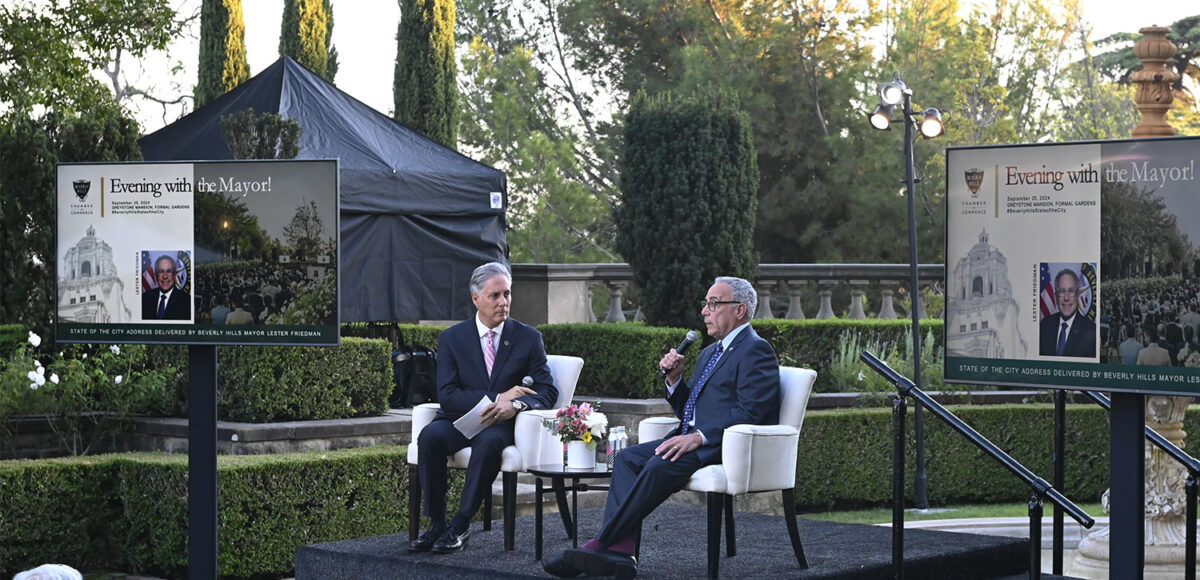On Sept. 25, Beverly Hills Mayor Lester Friedman delivered the annual State of the City Address at “An Evening with the Mayor” hosted at the historic Greystone Mansion. The event, presented by the Beverly Hills Chamber of Commerce, also offered networking opportunities with business and government officials. Before the address, attendees were able to enjoy a reception accompanied by live music, hors d’oeuvres and wine.
Friedman took to a new format for this year’s State of the City Address, answering questions moderated by Jim Moret, Beverly Hills resident and chief correspondent for “Inside Edition.” Topics included city finances and public safety, as well as builder’s remedy, homelessness, the Olympics and antisemitism.
Six months into his second term as mayor, Friedman began his address by ensuring that the city is in “good shape,” attributing this success to everyone in the Beverly Hills community who “want to make the city work.” He also shared his optimism for the future, underscoring the news that the valuations in the city have gone up nearly $2 billion, according to the County Assessor’s Office.
Moret transitioned to Friedman’s focus on advancing state-of-the-art public safety technology, a perennial issue in Beverly Hills that Friedman has prioritized in his agenda as mayor. Since 2022, under Mayor Lili Bosse, the city has channeled its resources toward the Real Time Watch Center that utilizes police-controlled drones as the backbone of its 24/7 surveillance network. These centralized public safety services also include automatic license plate readers and advanced 911 calls that allow police officers to see exactly where the call is coming from. Currently, the city is beta testing the coordination between private cameras and public cameras to further enhance high-tech surveillance features to ensure that Beverly Hills is at the cutting edge of crime fighting.
On the topic of homelessness, which continues to plague not just Beverly Hills, but the rest of California, Friedman stated that the city has committed $15 million over the next decade to provide supportive care to those who are homeless.

Photo by Julianna Lozada
In a similar vein, Moret asked Friedman about builder’s remedy, which is an important topic in the city. As Friedman explained, the issues require striking a balance between the need for affordable housing and “changing the character, potentially, of the city.”
“During that period when we didn’t have an approved housing element, there is basically no limit as long as a builder puts up a project and 20% of it is affordable housing. The problem with that is that we have seen some projects that came in as affordable projects, but all of a sudden, there are other elements that are added to it. We as a city don’t believe that once you change the preliminary application and make it a significantly different use, that is still qualifies as under builder’s remedy,” said Friedman.
Friedman also spoke about the city’s vulnerability to wildfires, especially those residing in high-fire danger areas. As part of the city’s Outdoor Warning System, twelve different sirens—six in the north of the city and six in the south—have been installed to alert and warn those outdoors of potential or emergent hazards that may threaten life and/or property. The sirens can also send voice messages, spoken in English, Spanish and Farsi, to alert those of emergencies such as wildfires. The city will do its first round of testing around Roxbury Park on Sept. 29.
In a subject that elicited many groans from the crowd, Moret asked Friedman about the construction of two Metro D Line stations in Beverly Hills, specifically the sections up to La Cienega (section one) and from La Cienega to Century City (section two). Section one is slated to open at the end of 2025/beginning of 2026 and section two 1.5 years later. Friedman warned not to “place money on that,” but ensured that both stations will be open prior to the Olympics in 2028.
Speaking of the Olympics, Friedman added that while Beverly Hills doesn’t have the facilities to host athletic events, the city does have the finest hotels in Southern California, which will be a draw for attendees.
“We have been working with the Olympic Committee in terms of using our facilities and our restaurants. We’re hoping it brings a lot of money into the city and really highlights what we have to offer,” he said.
Finally, Moret pivoted to a more serious subject—the city’s strong stance on the epidemic of hate, more specifically, on antisemitism. In June, Friedman along with 13 other U.S. mayors took a trip to Israel to put forth the message that “the cities in the United States do support Israel,” amidst heightened news coverage on Gaza-solidarity encampments constructed on U.S. college campuses. Friedman and his wife are both first-generation Americans whose parents fled Europe under the threat of Nazism. In December, Friedman will host the Mayor’s Combat Antisemitism Conference, anticipating attendance of over 200 mayors from across the United States.
In his concluding remarks, Friedman stressed his optimism for what lies ahead, including new projects being proposed within the city. Despite the rejection by voters of the Cheval Blanc Beverly Hills Hotel, which Friedman supported, he expressed optimism that new projects will undergo close scrutiny to be a good fit for Beverly Hills.
“Everything looks positive coming up right now in terms of both the economy and just the community itself being together. We really look forward to what’s coming up,” he said.







